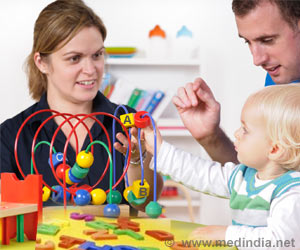Sex was by far the strongest determinant of which tasks people assigned to each spouse in heterosexual couples, but, it got extended to same-sex couples.

TOP INSIGHT
Among heterosexual couples, partner sex differences had the strongest overall effect on the assignment of chores and childcare.
Titled, "Making Money, Doing Gender, or Being Essentialist? Partner Characteristics and Americans' Attitudes Toward Housework," the study examined responses from a nationally representative survey of more than 1,000 adults in 2015 to determine which characteristics, including relative income, masculine or feminine traits, and sex, shape Americans' ideas about how married couples should divide household labor -- indoor and outdoor chores, as well as childcare. Each respondent was randomly assigned a description of a heterosexual or same-sex couple. The description included information about each partner's occupation and income, as well as his or her hobbies and interests, which cued whether the partner had traditionally masculine or feminine traits. The respondents also received a list of chores and childcare-related tasks to assign between the two partners.
Quadlin and co-author Long Doan, an assistant professor of sociology at the University of Maryland, found that among heterosexual couples, partner sex differences had the strongest overall effect on the assignment of chores and childcare. "Nearly three quarters of our respondents thought that the female partners in heterosexual couples should be responsible for cooking, doing laundry, cleaning the house, and buying groceries," Quadlin said. "In addition, nearly 90 percent of our respondents thought that heterosexual men should be responsible for automobile maintenance and outdoor chores. Regardless of the partner's relative income or gendered hobbies and interests, our respondents gravitated toward the person's sex instead."
When respondents were asked to assign tasks between same-sex partners, traditionally female chores were generally given to the more feminine partner, and traditionally male tasks were typically assigned to the more masculine partner. According to the researchers, 66 percent of respondents believed the more feminine partner should be responsible for buying groceries, 61 percent felt that partner should cook, and 58 percent thought that partner should clean the house and do the laundry. On the other hand, 67 percent of respondents believed that the more masculine partner should handle automobile maintenance and outdoor chores.
"Even in same-sex couples where there are not sex differences between partners, people use gender differences as a way to approximate sex differences," Quadlin said. Women in heterosexual relationships were also expected to handle the majority of childcare tasks. Eighty-two percent of respondents said the female partner should be responsible for the children's physical needs, 72 percent thought she should take care of the children's emotional needs, and 62 percent believed the woman should be the stay-at-home parent. Male partners were assigned only one childcare task by a majority of respondents: 55 percent felt the man should be in charge of discipline.
When evaluating same-sex couples, 62 percent of respondents expected the more feminine partner to attend to the physical needs of the children, and 60 percent believed the more feminine spouse should handle the emotional needs of the children, the researchers said. The findings for whether the more masculine or feminine partner should be the stay-at-home parent and be in charge of discipline were not statistically significant for same-sex couples.
Interestingly, the effect of relative income on the allocation of chores and childcare responsibilities was consistently weak for both heterosexual and same-sex couples. For example, according to the researchers, 75 percent of respondents said that the female partner in heterosexual relationships should be responsible for doing laundry, compared to 57 percent who said the responsibility should fall to the lower-earning partner.
"Sex was by far the strongest determinant of which tasks people assigned to each spouse in heterosexual couples," Quadlin said. "But, surprisingly, that theme extended to same-sex couples. When there wasn't a sex difference between partners, people relied on information about gender to guide their beliefs about what people should be doing. So, in other words, they took the heterosexual norm, where there are certain chores that men are expected to do and certain chores that women are expected to do, and used that same rationalization to determine household responsibilities for same-sex couples. We were surprised that happened to the extent that it did, because we thought expectations for household responsibilities would be more egalitarian between same-sex partners."
In terms of the study's importance, Quadlin said the research provides insight into the state of gender equality in America. "Determining who does what in the home is a complex negotiation that reflects underlying power dynamics in the household," Quadlin said. "We have public policies aimed at ensuring that women and men have equal earnings, but those policies will not necessarily advance gender equality in the home if people maintain such gendered attitudes. Even if women have higher earnings than their husbands, they are expected to come home and perform a second shift of chores and childcare."
Source-Eurekalert
 MEDINDIA
MEDINDIA




 Email
Email






